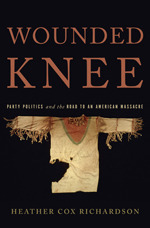Take a photo of a barcode or cover
16 reviews for:
Wounded Knee: Party Politics and the Road to an American Massacre
Heather Cox Richardson
16 reviews for:
Wounded Knee: Party Politics and the Road to an American Massacre
Heather Cox Richardson
There is so much in this book - it presents and contextualizes events that most of us probably think of as separate, if we think of them at all. That said, the focus of the book seems to get lost in the details.
challenging
emotional
reflective
sad
tense
medium-paced
Sad. We should always question our government. Always
informative
HCR artfully explains the larger political landscape that surrounded and led to this tragic event. America has a lot to be ashamed of – then and now.
challenging
emotional
informative
medium-paced
If you haven't already read her book Wounded Knee, read it now. If you can't afford to buy it, check it out from your local library. If your library doesn't have it go to the reference desk and ask them to buy it. If they refuse, tell them to order it for you through Inter-library loan (ILL). The book is phenomenal and the history relates to current events. Everyone should read this one.
A little too opinionated at times, and very hard (although perhaps deservedly so?) on Benjamin Harrison and his Republican cronies, but an interesting perspective that the tragedy at Wounded Knee against the Sioux Indians was mostly motivated by party politics (less Indians meant more settlers and more settlers meant Republican voters). So while the book does a good job of going back and forth between politics and the Indian Wars, it does suffer a little in that it almost goes back and forth too much, taking away a little from each aspect of the story which perhaps both warranted greater in-depth coverage. And the politicizing of views was a little distracting too. I like my history books a little more impartial and Richardson certainly made her personal feelings obvious on the subjects that she covered.
Dr. Richardson keys off of the slaughter at Wounded Knee -- and tells the narrative of that day twice, as both introit and recessional. Between those tellings she outlines in tremendous detail the political machinations of the Benjamin Harrison administration, its inherent corruption (especially with regards to Indian agents), the dramatic struggle over tariff protectionism, the addition of multiple western States in order to guarantee late 19th century Republican dominance in the Senate.
The argument is that these political realities created the murderous machinery that played out at Wounded Knee in particular, and across Indian Country in general.
People (like myself) who consider Donald Trump to be the worst president in US history should bone up on Benjamin Harrison.
Students of the Ghost Dance will find extended and detailed discussions here, with reference to all available current scholarship.
Also notable is that the book relies on first person interviews conducted by Eli Ricker which weren't published until the 1980s and verified previously-discounted Indian version of the slaughter.
Excellent work. Highly recommended.
The argument is that these political realities created the murderous machinery that played out at Wounded Knee in particular, and across Indian Country in general.
People (like myself) who consider Donald Trump to be the worst president in US history should bone up on Benjamin Harrison.
Students of the Ghost Dance will find extended and detailed discussions here, with reference to all available current scholarship.
Also notable is that the book relies on first person interviews conducted by Eli Ricker which weren't published until the 1980s and verified previously-discounted Indian version of the slaughter.
Excellent work. Highly recommended.
adventurous
challenging
dark
informative
reflective
sad
tense
medium-paced
This book is a prescient reminder of the dangers of extreme party politics.
Cox Richardson sets the 1890 massacre in the vital context of the 1888 Presidential election of Harrison, the political appointment of hacks to the civil service, the pressure to make the Dakota Territory into multiple voting states for Senate and Electoral College leverage, the election of senators by state legislatures (which means sucking up to local S. Dakota people), the 1890 midterm elections, the rise of Alliances for silver currency, that forbidding people to eat offal leads to malnutrition, the declining funding of the American army vs. the navy, and the careers of the Sherman brothers and their nephew in-law Nelson Miles.
challenging
informative
medium-paced
challenging
dark
informative
medium-paced




